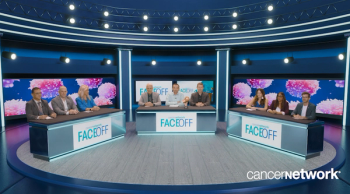Bispecifics, Sequencing, and Beyond: A Multiple Myeloma Face-Off

EP. 1: Talquetamab, a GPRC5DxCD3 bispecific antibody (BsAb), for Relapsed Refractory Multiple Myeloma: MonumenTAL-1 Data and Implications
ByAjai Chari, MD,Thomas G. Martin, MD,Jens Hillengass, MD, PhD ,Beth Faiman PhD, MSN, APN-BC,BMTCN, AOCN, FAAN, FAPO ,Louis Williams, MD,Shebli Atrash, MD ,Donna Catamero, ANP-BC, OCN, CCRC,Cesar Rodriguez Valdes, MD ,Shambavi Richard, MD Panelists discuss how Talquetamab, a novel GPRC5DxCD3 bispecific antibody, shows promising results in treating relapsed/refractory multiple myeloma based on the MonumenTAL-1 trial data, potentially offering a new therapeutic option for this challenging patient population.

EP. 2: Bispecific Antibody Combinations In Relapsed Refractory Multiple Myeloma: TRIMM-2 Study
ByAjai Chari, MD,Thomas G. Martin, MD,Jens Hillengass, MD, PhD ,Beth Faiman PhD, MSN, APN-BC,BMTCN, AOCN, FAAN, FAPO ,Louis Williams, MD,Shebli Atrash, MD ,Donna Catamero, ANP-BC, OCN, CCRC,Cesar Rodriguez Valdes, MD ,Shambavi Richard, MD Panelists discuss how the TRIMM-2 study explores the potential of combining bispecific antibodies to enhance treatment efficacy in patients with relapsed/refractory multiple myeloma, potentially offering a novel therapeutic strategy for this difficult-to-treat condition.

EP. 3: Bispecific Antibody Combinations In Relapsed Refractory Multiple Myeloma: RedirecTT-1 Follow-Up
ByAjai Chari, MD,Thomas G. Martin, MD,Jens Hillengass, MD, PhD ,Beth Faiman PhD, MSN, APN-BC,BMTCN, AOCN, FAAN, FAPO ,Louis Williams, MD,Shebli Atrash, MD ,Donna Catamero, ANP-BC, OCN, CCRC,Cesar Rodriguez Valdes, MD ,Shambavi Richard, MD Panelists discuss how the follow-up results from the RedirecTT-1 study provide insights into the long-term efficacy and safety of bispecific antibody combinations in treating relapsed/refractory multiple myeloma, potentially shaping future treatment approaches for this challenging disease.

EP. 4: Prophylactic Tocilizumab in MajesTEC-1 for the Reduction of CRS
ByAjai Chari, MD,Thomas G. Martin, MD,Jens Hillengass, MD, PhD ,Beth Faiman PhD, MSN, APN-BC,BMTCN, AOCN, FAAN, FAPO ,Louis Williams, MD,Shebli Atrash, MD ,Donna Catamero, ANP-BC, OCN, CCRC,Cesar Rodriguez Valdes, MD ,Shambavi Richard, MD Panelists discuss how prophylactic use of tocilizumab in the MajesTEC-1 trial may reduce the incidence and severity of cytokine release syndrome (CRS) in patients receiving bispecific antibody therapy for multiple myeloma, potentially improving treatment safety and tolerability.

EP. 5: OPTec: Outpatient Step Up Administration of Teclistamab: Implications in Real-World Practice
ByAjai Chari, MD,Thomas G. Martin, MD,Jens Hillengass, MD, PhD ,Beth Faiman PhD, MSN, APN-BC,BMTCN, AOCN, FAAN, FAPO ,Louis Williams, MD,Shebli Atrash, MD ,Donna Catamero, ANP-BC, OCN, CCRC,Cesar Rodriguez Valdes, MD ,Shambavi Richard, MD Panelists discuss how the OPTec study, which explores outpatient step-up administration of teclistamab, could impact real-world practice by potentially improving patient convenience and reducing healthcare resource utilization in the treatment of multiple myeloma.

EP. 6: Sequencing Therapies in Relapsed Refractory Multiple Myeloma: Bispecifics and CAR T-Cell Therapies
ByAjai Chari, MD,Thomas G. Martin, MD,Jens Hillengass, MD, PhD ,Beth Faiman PhD, MSN, APN-BC,BMTCN, AOCN, FAAN, FAPO ,Louis Williams, MD,Shebli Atrash, MD ,Donna Catamero, ANP-BC, OCN, CCRC,Cesar Rodriguez Valdes, MD ,Shambavi Richard, MD Panelists discuss how the optimal sequencing of bispecific antibodies and CAR T-cell therapies in relapsed/refractory multiple myeloma could maximize treatment efficacy and improve patient outcomes in this challenging disease setting.

EP. 7: Dosing Interval and Considerations for Bispecifics Combination in Relapsed Refractory Multiple Myeloma
ByAjai Chari, MD,Thomas G. Martin, MD,Jens Hillengass, MD, PhD ,Beth Faiman PhD, MSN, APN-BC,BMTCN, AOCN, FAAN, FAPO ,Louis Williams, MD,Shebli Atrash, MD ,Donna Catamero, ANP-BC, OCN, CCRC,Cesar Rodriguez Valdes, MD ,Shambavi Richard, MD Panelists discuss how optimizing dosing intervals and carefully considering combination strategies for bispecific antibodies in relapsed/refractory multiple myeloma could enhance treatment efficacy while managing toxicities and improving patient quality of life.

EP. 8: Clinical Scenario: A 58-Year Old Woman with Relapsed Refractory Mutiple Myeloma, post-ASCT, MRD-negative, on Bispecific Therapy
ByAjai Chari, MD,Thomas G. Martin, MD,Jens Hillengass, MD, PhD ,Beth Faiman PhD, MSN, APN-BC,BMTCN, AOCN, FAAN, FAPO ,Louis Williams, MD,Shebli Atrash, MD ,Donna Catamero, ANP-BC, OCN, CCRC,Cesar Rodriguez Valdes, MD ,Shambavi Richard, MD Panelists discuss how to approach treatment decisions and management strategies for a 58-year-old woman with relapsed/refractory multiple myeloma who is post-autologous stem cell transplant, MRD-negative, and currently receiving bispecific antibody therapy, considering factors such as prior treatments, response duration, and long-term treatment goals.

EP. 9: Clinical Scenario: Implementation of Bispecific Therapy for Relapsed Refractory Multiple Myeloma in a Community Center
ByAjai Chari, MD,Thomas G. Martin, MD,Jens Hillengass, MD, PhD ,Beth Faiman PhD, MSN, APN-BC,BMTCN, AOCN, FAAN, FAPO ,Louis Williams, MD,Shebli Atrash, MD ,Donna Catamero, ANP-BC, OCN, CCRC,Cesar Rodriguez Valdes, MD ,Shambavi Richard, MD Panelists discuss how community centers can effectively implement bispecific antibody therapy for patients with relapsed/refractory multiple myeloma, addressing challenges such as staff training, patient monitoring, and managing potential adverse events in a non-academic setting.

During the 2024 IMS conference, teams from Cleveland, Ohio, and New York,
New York, met to debate the latest advances in multiple myeloma.



